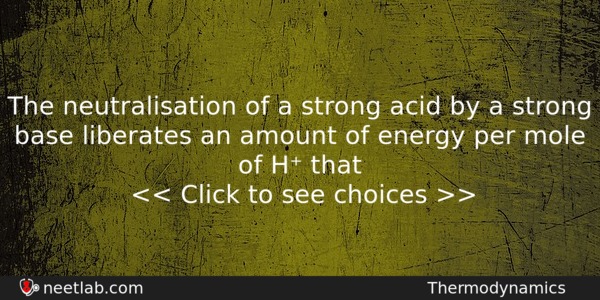| ⇦ | 
| ⇨ |
The neutralisation of a strong acid by a strong base liberates an amount of energy per mole of H⁺ that
Options
(a) depends upon which catalyst is used
(b) depends upon the temperature at which the reaction takes place
(c) depends upon which acid and base are involved
(d) is always is same
Correct Answer:
is always is same
Explanation:
Strong acids and strong base dissociate completely in solution to give H⁺ and OH⁻ in solution.
e.g. NaOH → Na⁺ + OH⁻,
HCl → H⁺ + Cl⁻. So the amount of energy liberated is always the same, as the reaction involved is , H⁺ + OH⁻ → H₂O.
Related Questions: - For making distinction between 2-pentanone and 3-pentanone the reagent to be
- Which of the following statements is correct regarding the drawbacks of raw rub
- A sample of CaCO₃ is 50% pure. On heating 1.12 L of CO₂ at STP is obtained
- Temperature coefficient of a reaction is 2. When temperature is increased
- The complex [Co(NH₃)₅Br]²⁺ SO₄²⁻ and [Co(NH₃)₅SO₄]⁺ Br⁻ are
Topics: Thermodynamics
(179)
Subject: Chemistry
(2512)
Important MCQs Based on Medical Entrance Examinations To Improve Your NEET Score
- For making distinction between 2-pentanone and 3-pentanone the reagent to be
- Which of the following statements is correct regarding the drawbacks of raw rub
- A sample of CaCO₃ is 50% pure. On heating 1.12 L of CO₂ at STP is obtained
- Temperature coefficient of a reaction is 2. When temperature is increased
- The complex [Co(NH₃)₅Br]²⁺ SO₄²⁻ and [Co(NH₃)₅SO₄]⁺ Br⁻ are
Topics: Thermodynamics (179)
Subject: Chemistry (2512)
Important MCQs Based on Medical Entrance Examinations To Improve Your NEET Score
18000+ students are using NEETLab to improve their score. What about you?
Solve Previous Year MCQs, Mock Tests, Topicwise Practice Tests, Identify Weak Topics, Formula Flash cards and much more is available in NEETLab Android App to improve your NEET score.
Share this page with your friends

Leave a Reply